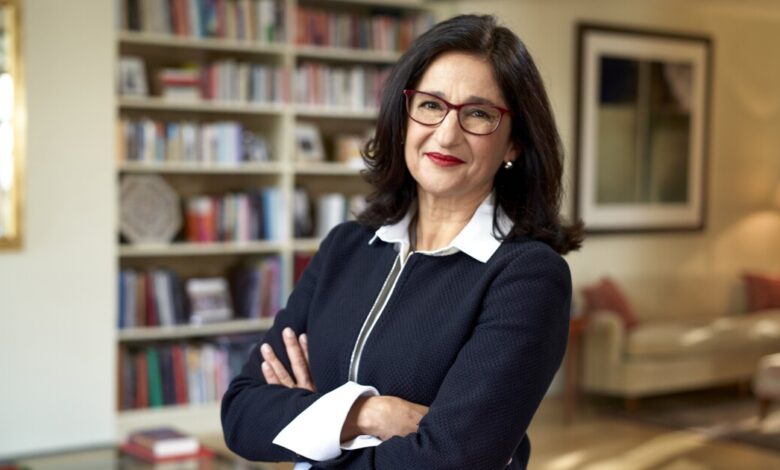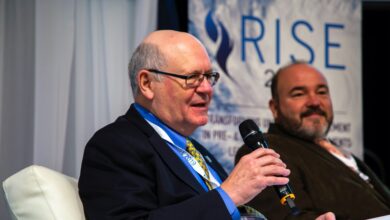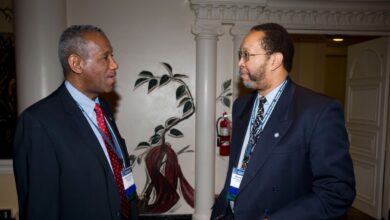Columbia Names Its First Female President

[ad_1]
Columbia University announced on Wednesday that the economist Nemat (Minouche) Shafik will be its next president, and the first woman to lead the university. Shafik, 60, has served as president of the London School of Economics and Political Science since 2017; her appointment at Columbia makes her the latest among a growing number of women named to lead major American research institutions.
In a Wednesday news conference, Jonathan Lavine, chair of Columbia’s Board of Trustees, called Shafik “a real leader and somebody who had incredible empathy for her students, for her faculty, for the community, and all the work that she’s done throughout the globe.”
Shafik will take office on July 1, replacing Lee C. Bollinger, who has led Columbia for the past 21 years. With her appointment, three-quarters of Ivy League institutions will now be led by women; Claudine Gay will begin as president of Harvard on the same day.
That’s “really, really exciting” news, said Andrea Silbert, president of the Eos Foundation, which supports gender equity and diversity in leadership. With Shafik’s appointment, Silbert said, 28 percent of presidents and presidents-elect of R1 institutions — those deemed by the Carnegie Classification of Institutions of Higher Education to have “very high research activity” — will be women. That represents an increase of 6 percentage points since September 2021, when 22 percent of R1 leaders were women. (The number of permanent leaders of institutions classified as R1 also rose in that period, from 130 to 146, though Silbert’s analysis of both periods excluded interim presidents.)
During the announcement, Columbia made no explicit reference to Shafik’s race. People of Middle Eastern or North African descent, like Shafik, are officially categorized by the U.S. government as white, though many members of that community disagree. When she was asked as a student if she was Black or white, Shafik reportedly replied, “I’m brown,” according to the Financial Times. But, the paper added, “She refused to tick a box.” (Columbia spokespeople did not immediately respond to a question about how Shafik self-identifies.)
Seven women of color lead R1 institutions, according to Silbert’s data.
“We still have a ways to go, but I think this is a really good indication that search committees are de-biasing. They’re working through whatever biases they may have, and they’re just open to having fair processes,” Silbert said.
We are at a moment in history when universities need to be both scholarly and relevant.
Joining Silbert in praising Columbia’s announcement was Audrey J. Murrell, a professor at the University of Pittsburgh who studies leadership, particularly among women and people of color. “You really are starting to see the glass ceiling crack” at high-profile institutions like Columbia, Murrell said, and to see them mirror greater leadership opportunities that have opened for women at smaller institutions in recent years. “I think that it’s really important for us to see the inclusion of women across the entire spectrum of higher education, and there have been historically some barriers in certain disciplines at higher levels. So the announcement for Columbia is a really impressive and important sign.”
Decisions like Columbia’s, Murrell said, are chipping away at the glass ceiling as well as its companion, the “glass cliff,” a phenomenon whereby women and people of color are offered high-risk leadership assignments, perhaps at institutions that are facing dire economic straits. “If they turn around the institution, they do not get the accolades and the opportunities for being a leader of a turnaround, and if those high risks fail, then it is challenging for them to get another leadership position,” Murrell said. But Columbia’s strong footing, and the fact that Shafik is being entrusted to carry the institution forward, dilutes such concerns, she added.
‘Elite Without Being Elitist’
The 15-member search committee, Lavine said, sat for 400 hours of meetings during a six-month search process that included 600 nominations for the job. Led by Lisa Carnoy, whose term as co-chair of the board ended in the fall, the committee drew on feedback from four advisory groups and four campuswide surveys, among other mechanisms.
Shafik was in some respects an unconventional choice to lead a major American research institution. For the past 15 years she has worked in and out of academe in England. Lavine first met Shafik for breakfast in London last year, saying in a nod to her unusual international background that he took the meeting after “recognizing that I should never just focus on conventional wisdom.”
Shafik is a native of Alexandria, Egypt, but she left the country with her family at age 4 amid political upheaval. She attended schools in Florida, Georgia, and North Carolina before graduating from the University of Massachusetts at Amherst with an undergraduate degree in economics and politics. She earned a master’s from the London School of Economics and Political Science and a doctorate from St. Antony’s College at Oxford University. In the early 2000s, she held academic appointments at the University of Pennsylvania and Georgetown University. Also on her resume are stints as a vice president at the World Bank, deputy managing director at the International Monetary Fund, and deputy governor of the Bank of England.
As Shafik takes over, she will have to navigate hot-button issues like race-conscious admissions and the potential fallout of Columbia’s drop in college ranking, because of alleged data-accuracy problems, to its lowest point since 1988.
In her introductory remarks, Shafik pointed to open science, international collaboration, inclusive curricula, and commercializing research as keys to a university’s success, and said universities must engage with their local communities as a means of combating skeptical public perceptions of higher ed.
Shafik said she’ll emphasize connections with the broader New York and global communities and pointed to a need to be “elite without being elitist.”
“We are at a moment in history when universities need to be both scholarly and relevant,” she said.
[ad_2]
Source link






